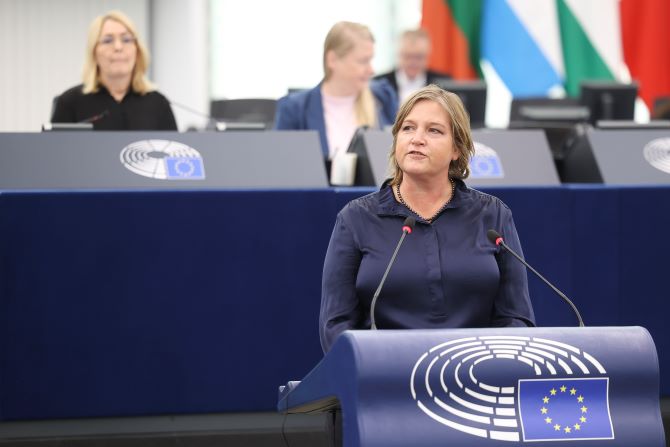On Tuesday, the European Parliament decisively approved a groundbreaking move to offer a loan of up to €35 billion to Ukraine, with Russia’s Central Bank’s immobilized assets serving as collateral for repayments.
In Strasbourg, the plan was supported by 518 votes, opposed by 56, and abstained by 61. Lawmakers agreed not to introduce any revisions to speed up final approval in the Council, where it has already received preliminary approval.
The European Parliament President Roberta Metsola, who welcomed President Volodymyr Zelenskyy in the hemicycle last week said, “This is another historic moment,”
“With this vote, we’re sending a very strong message that we’re using profits from Russian frozen assets for Ukraine, and Russia, as an aggressor, must and will pay for its destruction,” she added.
Notably, the proposed loan received backing from numerous far-right MPs who often oppose providing military and financial help to Ukraine. (The €35 billion will be undesignated, so Kyiv can spend it wherever it sees appropriate, including on armaments.)
Over 20 MEPs from the far-right Patriots for Europe (PfE) voted in favor of the credit, while over 40, including its president, Jordan Bardella, abstained. Bardella was one of the group leaders who met with Zelenskyy last week.
Related: Former Italian Banker Allegedly Hacks 3,500 Accounts, Including PM Meloni’s
Only 7 of the PfE’s 86 MEPs voted against the legislation text. The figures constitute a minor contrast to the resolution in support of Ukraine, which the Patriots overwhelmingly rejected in July.
However, the Europe of Sovereign Nations (ESN) group, the most radical and disruptive movement on the right, reaffirmed their enmity and voted unanimously against the loan.
The clear majority of the hard-right European Conservatives and Reformists (ECR) group, led by Giorgia Meloni’s Brothers of Italy and Poland’s Law and Justice, supported the move, as they have done on numerous Ukraine-related issues.
No parliamentarians from the moderate parties, the European People’s Party (EPP), the Socialists and Democrats (S&D), or Renew Europe, voted against Tuesday’s legislation.
The largely anticipated approval from Parliament clears the door for the loan to be disbursed quickly.
Once the Council has given its final approval, the European Commission will be able to raise the funds on the market and commence payouts to Kyiv in early 2025. However, some of the puzzle parts are still missing.
The €35 billion credit is intended to be the EU’s contribution to a larger G7 proposal to assist Ukraine with an emergency financial relief loan of €45 billion ($50 billion).
The windfall income from Russia’s blocked assets will be used to finance the progressive payments and interest rates, excluding Kyiv and the West’s coffers.
Under EU legislation, sanctions against Russia must be renewed every six months, allowing a single country to halt the move, unfreeze assets, and destabilize the G7 loan.
Fearing a Hungarian veto, Washington sought a longer renewal time to improve the stability and predictability of the untested plan.
Brussels subsequently proposed renewing the sanctions on the frozen assets every three years (36 months).
But Hungary stated it would veto any changes to the sanctions regime until Americans vote for their next president on November 5. (Prime Minister Viktor Orbán has stated that he will celebrate Donald Trump’s victory with “several bottles of champagne.”
Diplomats dismissed Budapest’s argument as unhelpful, noting that the more the EU contributes to the G7 plan, the greater the risk to the common budget.
According to the Financial Times, the US has expressed its willingness to carry €18 billion ($20 billion) even if Orbán maintains his veto. The compromise could reduce the EU’s contribution from €35 billion to €18 billion, with both parties receiving equal shares.
The United Kingdom, Japan, and Canada will provide the remaining funds. London has announced a contribution of £2.26 billion (€2.7 billion, $3 billion), while Ottawa has pledged a contribution of 5 billion Canadian dollars.
Additional information on how much each ally will give is likely after the G7 financial ministers meet in Washington later this week.





